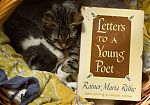
Rainer Maria Rilke
Letters to a Young Poet
As equally I think these letters could be called: Letters from a Young Poet. Not that gentle and well-worded Mr. Rilke was inept in self-expression but that the letters are replete with the tone of one still struggling with one’s chosen artistic medium. I also found myself thinking that it was also young Rainer Rilke who received these letters for there is the unmistakable tinge of something written for one’s self.
A work of art is good if it has sprung from necessity.
What lovely, beautiful letters they are! The poetics of Rilke’s struggle with words birthed sentences full of crystallizations, so that it has been for their never obscured direction that these letters have been praised. And quoted endlessly from and gone back to when it is exactly no-nonsense advice that is needed. While reading these letters I was aware of the machinations of the poet’s mind, telling himself over and over again, the same wise words he was writing.
What shame this elegant form of communication has been lost, arguably forever. Could you imagine Coetzee’s “Emails to a Young Writer?” By God no! Inconceivable! The time of musing with a pen in hand over a white sheet of paper have fallen into the annals of history and with it, much of the “gestation” that Rilke so rightfully expounds. The difference between an email and a letter, a letter and lesser forms of communication like SMS or chat, is like comparing Earth rocks to rocks from Mars.
“Patience is everything!” the poet wrote. The younger generations will not have any idea what that vital word means. The long stretch of time between letters and more importantly, the silence of patient waiting, will be unknown, as it most likely already is. One step ahead without knowing what the last step was. Life lived in the rapidly decreasing time it takes to arrive at the future. Are we missing something? We certainly are.
Everything is gestation and then bringing forth. To let each impression and each germ of feeling come to completion wholly in itself, in the dark, in the inexpressible, the unconscious, beyond the reach of one’s own intelligence, and await with deep humility and patience the birth-hour of new clarity: that alone is living the artist’s life: in understanding as creating.
“Everything is gestation!” I believe that to the depths of my very soul. So slow, so excruciatingly slow are the actual movements in our deepest underwater depths, so that only those who watch in silence and patience are aware of the miniscule ripples that cross imperceptibly across our surface.
Though, perhaps, my favorite advice was on comparison. Comparison is another disease facilitated by the internet. Sometimes, it has been my wicked intention when reading blogs to do so with the sole interest of seeing how I compare. I feel best when I don’t look at the internet for days. It seems that every social network site, every blog, is comparison’s fertile ground, making it easier, always easier to indulge in “looking outward.” It takes a very strong resistance to get beyond “all that.”
I beg you to give up all that… There is only one single way. Go into yourself. Search for the reason that bids you write; find out whether it is spreading out its roots in the deepest places of your heart, acknowledge to yourself whether you would have to die if it were denied you to write. This above all—ask yourself in the stillest hour of your night: must I write?
Such is the question Rainer Maria Rilke must have asked himself time and again during his “stillest hour.” Must I write? If we all had the courage to ask ourselves about the necessity of what we have chosen for our actions, renewing the question for each new and still hour, there would certainly be less “looking outward.” We would have no need for false bolstering for we would crave the absolute surety of our actions, desires, motivations, available only within ourselves.
When Rainer Rilke writes, “You ask whether your verses are good,” I understand the question which brought about that answer. Mr. Rilke, are my verses good? Have I succeeded in my outward attempts of giving voice to the cries which rise from my very soul? Mr. Rilke had also thought to himself: Are my verses good? But he found that this was not a question for the outside. This is a question for the inside. One’s verses are good when they lighten the cries of one’s soul. Absolutely no one is able to know this but one’s own self.
These Letters echo a nostalgia for a lost and slower time. When writers took the time to counsel other writers; when Europe was even slower and less populated; when patience was not such a faraway thing and gestation was observed by more than just a handful.
We must assume our existence as broadly as we in any way can; everything, even the unheard-of, must be possible in it.
· · · · · · · · · · · · · · · · · · · ·